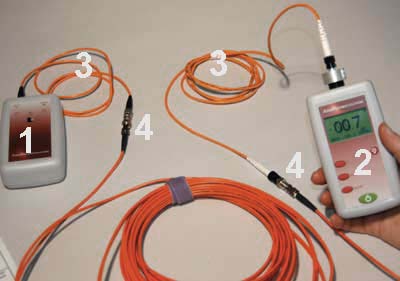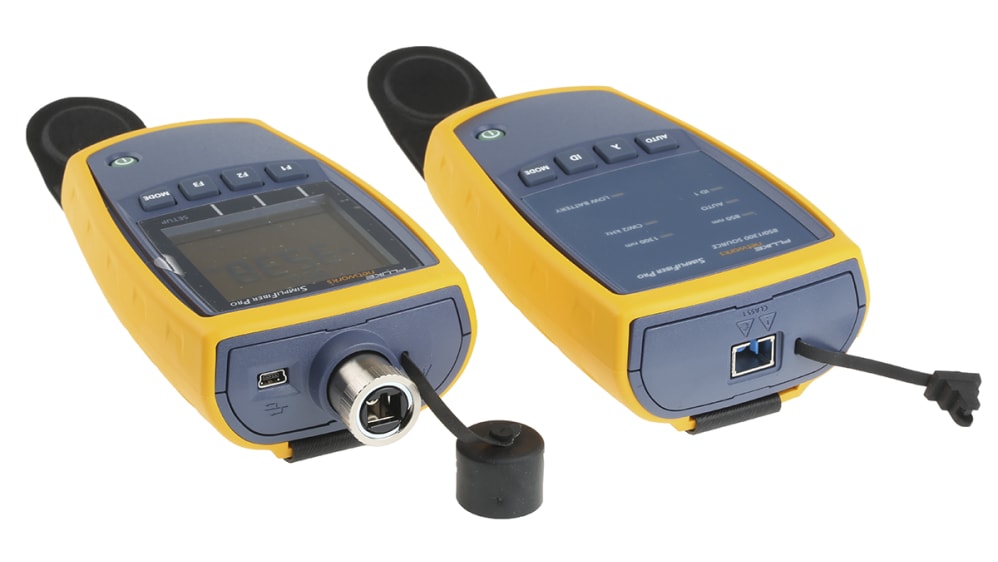Choosing the right optical fibre diameter analyzer for your industry needs
Choosing the right optical fibre diameter analyzer for your industry needs
Blog Article
A Comprehensive Overview to Optical Measurement System for Fiber Evaluation
When it pertains to fiber evaluation, comprehending optical dimension systems is vital for assessing efficiency and guaranteeing quality. You'll check out important methods like interferometry and spectroscopy, which aid you determine key parameters. There's more to it than just these methods; mastering depletion dimension techniques can considerably affect your network's efficiency. As you navigate through this guide, you'll uncover understandings that might change your strategy to optical fiber.
Understanding Optical Measurement Equipments
When you discover optical dimension systems, you'll find they're crucial for examining fibers with precision. These systems use light to assess different characteristics of fibers, including diameter, refractive index, and harmony. By employing techniques like interferometry and spectroscopy, you can get beneficial understandings right into the fiber's properties.You'll discover that these systems are developed to decrease mistakes and enhance accuracy, ensuring reputable data for your evaluation. Various configurations, such as single-mode and multi-mode systems, deal with specific fiber kinds, enabling you to choose the most effective suitable for your needs.Moreover, the integration of innovative software application tools aids you interpret the information efficiently, making it less complicated to determine any kind of variances or issues. As you explore much deeper into these dimension systems, you'll appreciate exactly how they streamline the analytical procedure and enhance the total high quality of fiber manufacturing and screening.
Key Specifications for Fiber Analysis
Key parameters for fiber analysis play an important role in identifying the quality and efficiency of fiber optics. When you evaluate a fiber, you'll desire to concentrate on attributes such as attenuation, transmission capacity, and modal dispersion. Depletion measures the loss of signal toughness as light travels with the fiber. A reduced depletion value shows far better quality and longer transmission distances - fibre testing equipment.Bandwidth describes the data-carrying ability of the fiber and is vital for high-speed communication. You'll require to analyze the transmission capacity to ensure it fulfills your application requirements. Modal diffusion, which occurs from the different speeds at which light travels via various settings in multimode fibers, affects signal quality
Techniques for Attenuation Measurement

Transmission capacity and Its Influence on Efficiency
Comprehending bandwidth is crucial for optimizing fiber efficiency, as it straight affects the quantity of data that can be sent over a network. Greater bandwidth implies you can send more details concurrently, enabling faster interaction and much better total efficiency. When you're dealing with optical fibers, it's crucial to consider just how transmission capacity connects with fiber attributes, such as core dimension and product properties.If the bandwidth is limited, you might experience data loss or slower speeds, influencing your applications. Additionally, different types of fibers can support differing bandwidth levels, so it's crucial to choose the appropriate fiber for your specific needs.You must also remember that environmental variables, like temperature and external interference, can influence bandwidth. By recognizing these facets, you can make informed choices to boost your fiber optic systems, ensuring reputable and reliable information transmission.
Refractive Index Measurement Methods

Overall Interior Reflection
Overall internal reflection (TIR) offers as a basic concept for measuring the refractive index of fibers. When light trips from a denser medium to a less thick one, it can only be fully shown if the angle of incidence exceeds a specific limit, recognized as the crucial angle. This sensation permits you to identify the refractive index by analyzing the angles at which light shows or refracts. By utilizing a setup that routes light right into a fiber and determines the resulting angles, you can compute the refractive index accurately. Comprehending TIR not only boosts your fiber evaluation yet also boosts the layout and why not try these out performance of optical systems. So, leveraging TIR can cause extra reliable fiber-based applications.
Interferometric Techniques
Structure on the concepts of total interior reflection, interferometric techniques offer an effective ways for gauging the refractive index of fibers with high accuracy. These methods make use of the disturbance patterns developed when light beam of lights split and recombine after traveling different courses. You can make use of setups like the Michelson or Mach-Zehnder interferometer to evaluate phase shifts triggered by adjustments in refractive index. By thoroughly calibrating your system and examining the resulting fringes, you can determine the refractive index with exceptional accuracy. It's important to preserve stable environmental problems to lessen mistakes. With these strategies, you'll improve your understanding of fiber residential properties, bring about much better performance in different applications, from telecoms to sensor innovation.
Modal Dispersion and Its Importance
Modal dispersion describes the dispersing of light pulses as they travel with a fiber, which can affect the total performance of the system. You'll see that this sensation can result in signal distortion, impacting data transmission prices and top quality. Recognizing its significance is vital for optimizing fiber optic designs.
Meaning of Modal Dispersion
In optical fiber communications, modal dispersion plays a considerable duty in identifying signal top quality and transmission rate. It occurs when different light modes travel at varying rates via the fiber. Considering that each mode has distinct courses and features, they can get to the receiving end at different times. This time distinction can lead to indicate spreading and distortion, which can degrade the overall efficiency of the interaction system. You could encounter modal dispersion primarily in multimode fibers, where the multiple courses of light worsen the concern. Comprehending modal dispersion is crucial for enhancing fiber styles and ensuring that your communication systems operate effectively, keeping the integrity of the transmitted signals over longer distances.
Results on Fiber Performance
Understanding modal dispersion helps highlight its impacts on fiber efficiency. This sensation takes place when different settings of light traveling at varying rates within the fiber, bring about signify dispersing in time. As you examine fiber optics, you'll see that boosted modal diffusion can substantially weaken signal high quality, resulting in minimized bandwidth and longer transmission distances. In useful terms, this indicates your information can arrive altered or postponed, influencing total communication efficiency. To reduce these effects, you might think about utilizing single-mode fibers, which reduce modal diffusion. By see here choosing the appropriate fiber kind and recognizing exactly how modal diffusion influences performance, you can enhance transmission high quality and guarantee trustworthy information transfer in your optical measurement systems.
Devices and Technologies for Optical Measurements
When it concerns optical measurements, several innovative tools and innovations are at your disposal to enhance fiber evaluation. You'll locate fiber optic testers, which analyze signal top quality and performance, important for preserving ideal network efficiency. Optical time-domain reflectometers (OTDRs) are essential for locating faults and determining loss over distances, supplying thorough insights into fiber honesty. In addition, spectrometers can assess light spectra, aiding you recognize product homes and composition.Don' t forget the value of imaging systems, like digital microscopes, that enable you to aesthetically check fiber surface areas for issues. Also, consider utilizing polarization analyzers to measure stress and anxiety and strain in fibers, which is vital for comprehending their habits under different conditions. By leveraging these tools and modern technologies, you can significantly boost your fiber evaluation processes, ensuring reliability and high performance in your optical networks.
Regularly Asked Inquiries
What Are the Expenses Related To Optical Measurement Equipments?
The expenses associated with optical dimension systems can differ greatly. You'll need to evaluate equipment prices, maintenance charges, software licenses, and prospective training expenditures. Budgeting meticulously will aid you avoid unexpected economic challenges down the line.

Just How Commonly Should Fiber Evaluation Be Executed?
You need to perform fiber evaluation regularly, normally every six months or after substantial adjustments in the atmosphere (fiber measurement). This guarantees perfect efficiency and aids page recognize potential problems before they affect your system's effectiveness and reliability
Can Optical Measurement Solutions Be Calibrated in your home?
Yes, you can calibrate optical measurement systems in your home, yet it requires precision. Ensure you comply with the maker's guidelines, utilize appropriate calibration standards, and double-check your results to assure accuracy in your dimensions.
What Industries Frequently Utilize Optical Measurement Equipments?
You'll locate optical measurement systems commonly made use of in sectors like telecoms, manufacturing, medical care, and research. They're necessary for quality assurance, fiber analysis, and making sure specific dimensions in different applications, enhancing effectiveness and precision across fields.
Exist Any Kind Of Safety Worries With Optical Measurement Systems?
Yes, there are safety and security worry about optical measurement systems. You ought to constantly use safety eyeglasses to shield your eyes from intense lights and guarantee appropriate training to take care of equipment securely and stay clear of crashes.
Report this page